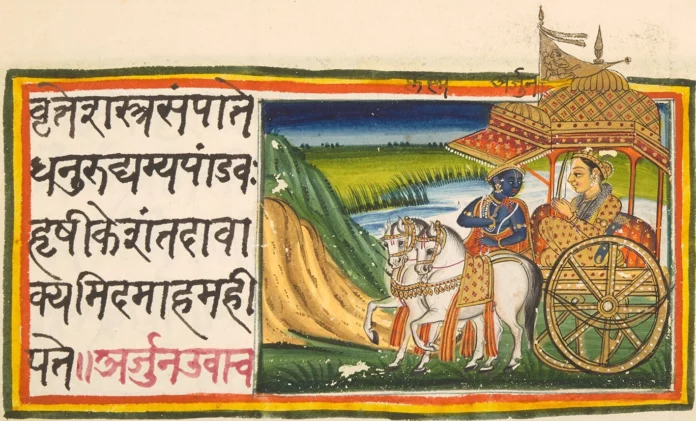With its infinite life lessons and spiritual insights, the Gita offers us a profusion of wisdom to deal with the intricacies of marriage, love, and sex. After all, our ancient texts hold the best-kept secrets when it comes to union, devotion and passionate fulfilment.
In the vast tapestry of human existence, the subject of love, marriage, and sex may seem quite complex and fascinating. These aspects of our lives intertwine to create an array of desires, feelings, and connections that constitute our very existence. But, as we seek guidance and understanding amidst the ebb and flow of our relationships, navigating the complexities of these subjects can often be a challenging task.
In our search for wisdom, we often find ourselves seeking answers from the ageless lessons of our ancient scriptures. Among the endless source of spiritual knowledge, the Bhagavad Gita shines like a beacon, illuminating the route to a profound understanding of the sacred union of marriage, meaning of love, and the power of sexual intimacy.
As we skim through the verses of the Bhagavad Gita, we embark on a transformative journey, exploring the depths of its sacred wisdom. When we unravel its verses, we are transported to a realm where the ultimate Lord Krishna himself bestows divine counsel to the warrior prince Arjuna.
Through a profound exchange of dialogues between Lord Krishna and Arjuna, the Gita unfolds the intricacies of marriage, telling us that it is more than just a social contract or a source of personal fulfilment, but a spiritual union of two souls. It leads us to recognize that the purpose of marriage extends beyond our personal desires, rather it is more about fulfilling our duties and responsibilities towards our partner, family, and society.
The Gita text also delves into the subject of love, which is the very essence that sustains and nourishes a relationship. Lord Krishna encourages us to cultivate a sort of love that is selfless and unconditional, which transcends beyond any attachment or ego. Such love not only fosters a strong sense of togetherness and compassion but also understanding among a couple, allowing it to flourish and succeed.
Furthermore, the Gita also offers invaluable lessons for managing the complex dance of sexual intimacy. It teaches us to embrace the alluring aspect of our lives with a sense of awareness, recognizing that it is an intense expression of love, procreation, and the solidification of a marital bond, rather than a physical need.
As we dive into the wisdom of the Bhagavad Gita, we discover the mysteries that are hidden within its verses, transforming our perspective and experience of marriage, love, and sex.
Understanding the Purpose of Marriage
The Bhagavad Gita defines marriage as a divine union where two souls unite to support each other’s spiritual growth. It goes beyond the superficial facets of marriage and accentuates the fulfilment of duties and responsibilities towards one’s partner, family, and society. The Gita enlightens us that marriage is an opportunity for companionship, support, and learning. It inspires couples to approach their relationship with respect, understanding that it is not solely for personal satisfaction but a medium for selflessness and serving the greater good. By accepting the real meaning of marriage, one can have a blissful and spiritually enriched bond that promotes love, understanding, and peace.
By fostering a peaceful and loving relationship, we serve as role models for others and have a positive impact on society at large. In this way, marriage transforms into a vehicle of selflessness as we work to uplift and assist not only our partner but also the entire community in which we live.
Cultivating Unconditional Love
Bhagavad Gita 2.47:
“You have a right to perform your prescribed duties, but you are not entitled to the fruits of your actions. Never consider yourself to be the cause of the results of your activities, nor be attached to inaction.”
As stated in the indicative verses of Gita, love plays a significant role in any successful marriage. The text encourages us to nurture a love that is selfless and unconditional. Lord Krishna emphasizes the value of unconditional love and urges us to love our partners without expecting anything in return. This form of love transcends beyond any ego and cultivates a sense of oneness and compassion between the couple. It allows us to let go of our attachments to the outcomes of our love and instead draws our attention to the act of loving itself. As we realize that love is not a transaction but rather a sincere outpouring of our feelings, it inspires us to let go of expectations and the need for reciprocity.
As we practice unconditional love, the barriers that divide us from our partners seem to dissolve on their own. We develop a strong sense of solidarity, recognizing that we are interconnected and interdependent. This unity cultivates a deep feeling of empathy and compassion that further enables us to understand and support our partners on their individual journeys.
Respecting Individuality and Embracing Differences
In any marriage, it is impossible to avoid differences as they are bound to arise due to the unique nature and perspectives of both partners. The Gita in this case, highlights the importance of respecting and embracing these differences. Lord Krishna teaches us to acknowledge the fact that every individual has a different journey and purpose in life. He stresses the importance of understanding and embracing these differences, acknowledging that they are not obstacles, but rather opportunities for mutual learning and growth.
Respecting individuality within a marriage entails valuing one’s unique qualities, perspectives, and goals. It involves building an atmosphere where both partners feel appreciated and supported in their individual pursuits. By acknowledging and accepting these differences, we can cultivate an atmosphere of peace and mutual growth within a relationship.
Practising Detachment
Bhagavad Gita 6.4:
“When one is neither attached to sense objects nor to actions, such a person is said to be elevated in the science of Yog, having renounced all desires for the fruits of actions.”
The concept of detachment, as discussed in the Bhagavad Gita, holds great importance in the context of marriage. Detachment is not the same as being indifferent or apathetic, rather, it refers to a condition of equilibrium where one is not unduly dependent on the outcomes of their actions. This principle can be applied to marriage by wholeheartedly loving and serving our spouse without being dependent on their actions or anticipating any specific results. By practising detachment, we can easily deal with the complications of marital life with a sense of calm and stability.
Balancing Physical and Spiritual Intimacy
Sexual intimacy plays an important role in marital relationships, and the Gita recognizes its significance while offering guidance on its proper position within the marital relationship. Lord Krishna in his dialogue with Arjuna, stresses the importance of practising sex within the bounds of ‘dharma’ (righteousness). It urges us to view sexual intimacy as a means of expressing love, procreation, and strengthening marital bonds. The Gita serves as a reminder that sexual activity should not only be motivated by bodily impulses but also by love, respect, and mutual consent.
Overcoming Lust and Ego
Bhagavad Gita 3.37
“The Supreme Lord said: It is lust only, Arjuna, which is born of contact with the material mode of passion and later transformed into wrath, and which is the all-devouring sinful enemy of this world.”
The Gita warns us against the evil forces of lust and ego, which can cause trouble in marital harmony and can lead to suffering. It teaches us to overcome these negative traits by fostering self-control, discipline, and a sense of selflessness. By overcoming our desires and ego, we can create an environment of love, togetherness, and understanding, within the marital relationship. With these infinite lessons, the Gita offers us a roadmap to deal with the complexities of these realms, guiding us toward a peaceful, fulfilling, and spiritually enlightened union.









